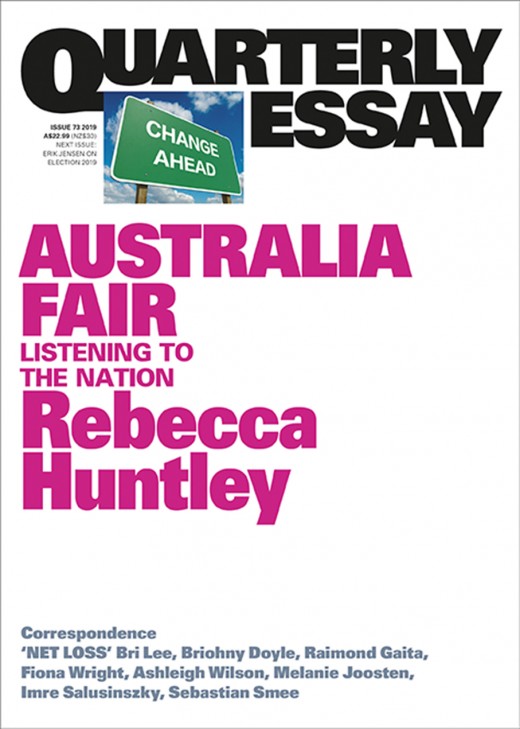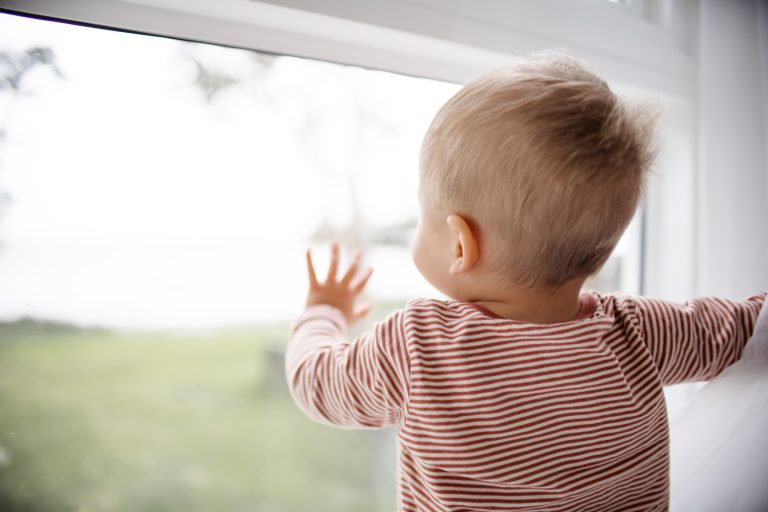In reply to Rebecca Huntley’s Quarterly Essay, Australia Fair: Listening to the Nation

At the heart of Rebecca Huntley’s Australia Fair is the idea that we are a nation of democrats. Our affinity with democracy is much more than the process of voting to elect a government. It is our collective desire for a confident democracy, with government as an active and effective partner, and a fairer society where all Australians can live flourishing lives.
This is a powerful idea in an essay that I felt was spot-on in its claim that “there is an opportunity to renew social democracy, Australian-style.” The Centre for Policy Development’s research, which Huntley cites, discovered an Australian appetite for democratic and policy renewal, along with broad agreement on the direction of travel. We found that Australians believe democracy is a force for fairness and equality and would throw their support behind changes that get government and the economy working better for the community.
The federal election result does not disprove Huntley’s core claim. Elections are about placing trust in a person and a party to respond to the biggest problems and the greatest opportunities of our time. A clear set of ideas and policies can help to build trust. Ideas can also sow distrust and division. The election confirmed that citizens remain profoundly divided on the best path forward for the nation. But I am willing to believe, as Centre for Policy Development research shows, that all Australians share a desire to improve the lives of others and tackle our biggest problems together.
Many conservatives have forgotten the point Robert Menzies made in October 1942, when he said that Australians “disagree among ourselves on almost every conceivable subject, but we are all democrats.” Menzies said our “most grievous error” has been to think “too much of democracy in mechanical terms.” He also said, somewhat ominously, that “if, as a voter, I am concerned only with my own advantage and am indifferent to the cost to others, I am simply corrupt. I am selling my vote for an individual mess of pottage.”
Truth be told, most Australians have equated national politics in Canberra with a thick stew. The pressure-cooker environment of the past decade has produced an enormous gap between what Australians want from their democracy and what it has delivered. More than two-thirds of Australians told CPD that they do not believe their elected representatives serve their interests. Three-quarters believe politics is fixated on short-term gains instead of long-term challenges. They are not sure government will help to look after them, their families and their communities over the long term.
In April, Gabrielle Chan reported for The Guardian on the fury in Farrer, an electorate in country New South Wales stretching along the Murray River from Wentworth to Albury. The source of the fury was water, or the lack of it, in a land beset by drought. Months earlier, the South Australian Murray-Darling Royal Commission had described the “do-nothing” conduct of the senior management and the board of the Murray-Darling Basin Authority in relation to climate change as “negligent” and “unlawful.” Farrer didn’t fall to an independent, as some thought it might, but there was a swing of almost 10 per cent against the sitting member.
I spent six months in Albury in 2017. What struck me was how different the conversation about climate change was on Dean Street in Albury, compared to the rhetoric a few hundred kilometres up the road in Canberra. What the locals in Albury couldn’t stand most of all was being treated like mugs – taken for granted or ignored in the national conversation. Tellingly, it was a road trip from Sydney to Adelaide via Deniliquin, a town near the Murray River, that the Reserve Bank’s deputy governor, Guy Debelle, used to frame his landmark speech about climate change and the economy in March this year. Describing climate change as a “trend” change likely to have “first-order” economic effects, Dr Debelle said:
“The transition path poses challenges, but it also presents opportunities. Particular industries and particular communities that are especially exposed to the costs of changes in the climate will face lower costs if there is an early and orderly transition. Others will bear greater costs from the transition to a lower carbon economy. While others still, such as the renewables sector, may benefit from that transition. But unlike the example of trade, it may not be possible for the winners to compensate the losers in a way that leaves no-one worse off.”
The election result has not washed away these problems. They will become more acute. The murkiness of the Murray-Darling Basin Authority and water buybacks is one thing. The lack of a coherent national strategy on climate change is another. Bizarrely, compelling evidence in support of constructive policy change does not lead to political action. But inaction like this is not limited to climate change.
Instead of climate change, consider “jobs” as an example. In the 2018 December quarter, the unemployment rate in Albury City was 9.26 per cent, more than double the overall rate in New South Wales. That same month, the report I Want to Work: Employment Services 2020 was released by the then federal minister for jobs, Kelly O’Dwyer. This expert review of jobactive, Australia’s $6.5 billion employment services system, consulted more than 1400 jobseekers, employers, employment services providers and community groups. Its blunt assessment was that Australia “can do better. Much better.” Consultant-to-client ratios were 1:148. Only 4 per cent of Australian employers were using jobactivein 2018 (down from 18 per cent in 2007). The system was failing a large majority of jobseekers who had been on the books for twelve months or more.
Given that outsourced delivery contracts for jobactive were due to expire in 2020, here was a great opportunity to think big, act on expert advice and embrace local solutions that were fit for purpose. To build an employment services program in Albury, for example, that was designed to meet the needs of that community. The response? Apart from two trials, the can was kicked further down the road. Shortly before the federal election was announced, Minister O’Dwyer extended existing jobactive contracts for a further two years, to the middle of 2022. One of 2019’s biggest policy reform opportunities sank with barely a ripple. Providers damned in a national review won contracts for another two years. Our most disadvantaged jobseekers lost out – again. A thick stew indeed.
Huntley’s essay tells us that Australians do not want to do away with democracy. We want to save it. The big question is: how?
Just as Australian democrats value substance over style, so it goes that ideas developed with local communities will matter as much as national reforms to systems and processes. Good democracies are stable. But they are not static. Nostalgia, whether it be for the reform era of the 1980s and ’90s (vale Bob Hawke) or the sanctity of our Anglo-American alliances, will not help Australia to grow and decarbonise our economy, create secure jobs, find our way in Asia, build an education nation, achieve equal rights for women and give substance to the Uluru Statement from the Heart. Blind faith in markets, microeconomics and outsourced services will not elevate the public interest above shareholder interest. Put simply, the “good society” in the twenty-first century does not resemble the “good society” of last century. It is, Huntley writes powerfully, “there for the making.”
What is the point of Australia? Ben Chifley famously described one “great objective – the light on the hill,” which he defined as striving for the betterment of humankind not just in Australia but anywhere we may give a helping hand. Huntley offers another, built on the Australian Settlement, which is to solve big problems. She spruiks the strong social licence to act that governments often gain when Australians are convinced that “something is harmful to the collective good.” She also makes it clear that some of these challenges, not least climate change, will require “the kind of mobilisation of people and communities, assets and resources, governments and infrastructure usually reserved for a world war.”
Too often, attempts to galvanise communities around big challenges are done half-heartedly. As the Harvard University political scientist John Ruggie said on a visit to Australia in April, “If they’re not with you at take-off, they won’t be there when you land.” “Community deals” to boost economic and social inclusion, built from backbone institutions at the local level and based on place-based approaches, are a way forward. They can be used to tackle disadvantage and the inevitable transitioning of coal communities to new industries and opportunities. But they require honesty about the change ahead and genuine agency for affected communities to find hope and aspiration in a frank conversation about their future. We must be able to talk positively about what we hope to start in regional Australia, not simply what we want to stop, and bring everyone along on that journey.
The chance to mobilise Australia around new, bold missions was precisely why the Centre for Policy Development brought Mariana Mazzucato to Australia last year. Mazzucato’s work on public value and the entrepreneurial state doesn’t pit government against business, unions or the community. What it does provide is a framework for us all to agree on missions that we can have a crack at together. Achieving them would engage the long-held ambition Australians have for their democracy as a force for equality and help to satisfy their disposition to put growth on a smarter, more inclusive and more sustainable path.
Travers McLeod



